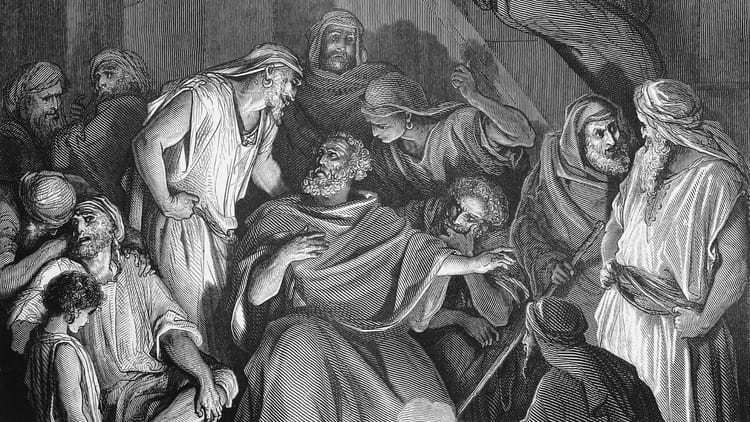The Danger of Self-Reliance (Mark 9:14-29)

Remember your first job? When I was a teenager, I got a job at an ice cream parlor. I think I trained for one night. The second night, the boss left me alone. I knew how to scoop a cone, but had no idea how to make anything on the menu. I remember flipping through the binder trying to memorize how to make all the sundaes and banana splits. Guess what the first person ordered? Something I didn’t know how to make. I was in way over my head.
We can all remember the first time that we were put in a position of responsibility, knowing that we could blow it. It may have been a job or looking after children. It was some time when we were left alone and in charge, and we weren’t sure we were ready.
We’ve been going through the Gospel of Mark. Today we are coming to a passage in which the disciples were in over their heads. This is a key episode in the training of the disciples, and it’s also a key story in teaching us something that we really need to understand.
Jesus had given his chosen disciples authority to cast out demons:
Jesus went up on a mountainside and called to him those he wanted, and they came to him. He appointed twelve that they might be with him and that he might send them out to preach and to have authority to drive out demons. (Mark 3:13-15)
Calling the Twelve to him, he began to send them out two by two and gave them authority over evil spirits. (Mark 6:7)
In today’s passage, some of the disciples had been left alone to deal with a demon while Jesus had been away on the mountain. No sooner had he come down from the mountain than he was faced with what the disciples had been up to while he was gone. It was chaos.
You think it’s bad to leave me in charge of an ice cream parlor for a night. Imagine being left by Jesus to minister in his absence. He’d prepared them, but they weren’t ready yet. They were in way over their heads.
Now, we need to look at this passage because we are in a very similar situation as we read in this passage. This passage teaches us three lessons that we need to know. First: that we’re faced with situations in ministry that are greater than we can handle. Two: that we have a tendency to be self-reliant instead of God-reliant. Finally: that God calls us to repent and depend on him.
So let’s look at these together, beginning with the first lesson we need to learn.
One: We are continually faced with situations in ministry that are greater than we can handle.
Verses 14 to 18 say:
When they came to the other disciples, they saw a large crowd around them and the teachers of the law arguing with them. As soon as all the people saw Jesus, they were overwhelmed with wonder and ran to greet him.
“What are you arguing with them about?” he asked.
A man in the crowd answered, “Teacher, I brought you my son, who is possessed by a spirit that has robbed him of speech. Whenever it seizes him, it throws him to the ground. He foams at the mouth, gnashes his teeth and becomes rigid. I asked your disciples to drive out the spirit, but they could not.”
What is the situation that the disciples faced? The disciples were acting as representatives of Jesus, entrusted by him with his ministry – the same, by the way as we are. Jesus had left them to act as his representatives, and had given them the authority they needed to carry out the ministry that he had left them. This is exactly the situation that we are in as well.
But the disciples soon discovered the limitations of their ability to act as representatives of Jesus. They were faced with a boy possessed with a spirit. We read in verses 21 and 22 that this spirit had been tormenting the boy since childhood. “It has often thrown him into fire or water to kill him” (Mark 9:22). It sounds a lot like epilepsy. Scripture is clear in differentiating illnesses like epilepsy from demon possession. We may struggle with understanding the spiritual dimensions of something like we read in this passage, but Scripture is clear that evil does exist, and Satan is intent on destroying and killing life. This boy had been dealing with this his entire life.
What was happening here? The disciples were facing a spiritual battle, human need, an extraordinary difficulty that was beyond their own resources. This is, by the way, the exact same thing we are facing today.
I got thinking this week about some of the challenges I’ve encountered in just the past few weeks. We have been commissioned to act as his representatives, and he has given us authority. But everywhere we turn, we realize we are way over our heads. If you haven’t been overwhelmed by the surrounding needs lately, you may not have taken a good look around you. These disciples encountered the boy being tormented with a spirit. We encounter all kinds of issues that are far beyond what we can handle: people who seem to be in spiritual bondage; people suffering with mental illnesses; marriages that are in trouble. We look around and see children living in impossible situations; people caught in addiction, or living in violent or even abusive situations.
Pause for a moment and see the enormity of what has been set before us. Once in a while we need to pause and say, “What Jesus has called us to do is humanly impossible.” I can’t preach a sermon that can change your life. No one here can deal with a situation like the disciples were dealing with on our own. Jesus calls disciples to tasks beyond our abilities.
Secondly, we need to see that this passage teaches us that we have a tendency to be self-reliant instead of God-reliant.
You’d think we would know that we need to depend on God to get anything done, but we have this tendency to rely on our own a lot. We spend a lot of time persuading others that we’re competent. We have a really hard time admitting that we are dependent on God rather than our own strength and techniques.
Picture the scene as Jesus comes down. The disciples are surrounded by a great crowd, and they’ve failed publicly. There’s nothing like being surrounded by a crowd while you fall flat on your face. The scribes are arguing with the disciples. The father is frustrated, and the boy is no better. It’s chaos.
What did Jesus say? Verse 19: “You unbelieving generation…how long shall I stay with you? How long shall I put up with you?” Do you get the impression that Jesus is frustrated? It’s interesting that he talks about an unbelieving generation. He’s really got a problem with the disciples, but actually he says that it’s a problem that characterizes everyone in that generation. This isn’t a problem that’s restricted to a few people. This is a problem that really affects everyone.
What’s the problem? Was the demon too powerful? There’s no doubt that this demon was powerful. Later Jesus says, “This kind can come out only by prayer” (Mark 9:29) implying that this is a harder case. The disciples had been able to cast out other demons before, so this was a more difficult demon.
But the problem, according to Jesus, wasn’t really the demon. Jesus doesn’t get frustrated with the demon. He actually had no problem with the demon. The problem, Jesus says, is not that the demon is too big. It’s that the faith of the disciples is too small. The problem isn’t the demon; the problem is the disciples. They were trying to handle things on their own.
This passage actually shows us the wrong way and the right way to handle the fact that we are spiritually dependent, that we are in way over our heads.
The wrong way – Where did the disciples fail? Listen to verses 28 and 29.
After Jesus had gone indoors, his disciples asked him privately, “Why couldn’t we drive it out?”
He replied, “This kind can come out only by prayer.”
This is shocking. It looks like the disciples relied on their own devices to handle the demon. It’s unthinkable, isn’t it? But let’s think about that a bit more. How many times have we tried to serve others with the same self-reliance as the disciples? Could it be that this is one of the reasons for our lack of power? Os Guinness says that this is exactly what is happening today:
The two most easily recognizable hallmarks of secularization are the exaltation of numbers and technique. Both are prominent in the church-growth movement. In its fascination with statistics and data at the expense of truth, this movement is characteristically modem… In a world of number crunchers, bean counters, and computer analysts, the growth of churches as a measurable, “fact based” business enterprise is utterly natural.
We try to do ministry on our own strength and in our own power.
The right way – But there’s a positive example in this passage. The father in this passage realizes he’s in way over his head. Is he self-confident? Not at all. “But if you can do anything, take pity on us and help us” (Mark 9:22). He’s not even sure that Jesus can help him. He’s not someone who has it all together.
The problem is that we think Jesus only deals with people who have it all together. But it’s the opposite: Jesus gives grace to those who acknowledge their need. When Jesus challenges him, the father says, “I do believe; help me overcome my unbelief!” (Mark 9:24). Do you realize what he’s saying? He is saying, “Help me just as I am, a doubter.” He does not plead based on how together he is. He realizes that he has nothing to make himself worthy. He doesn’t say, “Please heal my boy based on how much faith I have!” Instead, he pleads for mercy and throws himself at Jesus’ feet. True faith is always aware of how inadequate it is.
There’s a hint in this passage of how important this is. Mark has been drawing parallels between an Old Testament passage when Moses went up the mountain and met with God. When Moses came down, do you remember what he found? He found the Israelites worshiping a golden calf. Here, Jesus has come down from the mountain after meeting with God. Do you see what he found? Prayerless ministry. Do you see what Mark is saying here? It’s the same thing. Prayerless ministry is no better than idolatry. It’s dethroning God and putting our trust in technique and human strength instead of trusting in God alone.
Friends, this passage shows us that we have a tendency that is dangerous. If we persist in this tendency we will never be able to serve as representatives of Jesus. We will do stuff but it will lack power. The danger is that we will be self-reliant.
Henri Nouwen wrote:
We have fallen into the temptation of separating ministry from spirituality, service from prayer. Our demons say: “We are too busy to pray, we have too many needs to attend to, too many people to respond to, too many wounds to heal.” Prayer is a luxury, something to do during a free hour, a day away from work or on a retreat.
Maybe we fear prayer, because, as Nouwen says, prayer “is a way of being empty and useless in the presence of God and so of proclaiming our basic belief that all is grace and nothing is simply the result of hard work.”
I’m convicted by this because I think it describes us pretty accurately. We are continually faced with situations in ministry that are greater than we can handle. And we need to see that this passage teaches us that we have a tendency to be self-reliant instead of God-reliant.
So what is the solution?
We see in this passage that God calls us to repent and depend on him.
This is not just a random story. This story is in the part of the Gospel of Mark that describes the preparation process. Jesus was preparing the disciples for future ministry, and they had to learn this lesson or else they could never carry out the mission that Jesus was going to entrust to them. It appears that they learned, too, because later on in Acts you see the disciples continually engaging in prayer. Somebody has said that the early church was characterized by uneducated men agonizing, and today’s church is characterized by educated men organizing.
What’s the solution? Two things. I think we need to learn a lot from the father in this passage, and to admit to God that we believe, but we really don’t. We don’t even know how dependent we are on him. We accept that Jesus came to serve, to give his life, to rise so that we could have power and new life, but we still try to live on our own strength. Maybe this morning we need to repent and even admit that we don’t know how to be dependent, and then ask God to help us. “I do believe; help me overcome my unbelief!”
Then Jesus said, “This kind can come out only by prayer.” What challenges are we facing as a church that can only come out by prayer? When we encounter needs like the disciples did, where are we trying and arguing but not having any measurable impact? I wonder how things would change if we really believed what Jesus said in this passage; if we really acknowledged our need and depended on God for what only he can do.
Jack Miller was a pastor in Philadelphia. In 1970, Miller resigned from his church and seminary. Neither the church members nor the seminary students were changing in the ways that he had hoped. He didn’t know how to help them, so he quit and spent weeks too depressed to do anything but cry.
He came to realize a couple of things:
- that he was motivated by personal glory and the approval of people, rather than being motivated only by God’s glory;
- that he had been trusting in his own abilities, rather than in the promises God had made and the power of the Holy Spirit.
A turning point came when he realized his motivation for ministry had been all wrong, and that he had been relying on the wrong person to do ministry – himself. He came to understand that the work of ministry was far too big for him to accomplish on his own strength.
He came to understand that it was his pride and self-reliance that was keeping him from having a significant part in this great work of Christ…He saw that doing Christ’s work in Christ’s way meant giving up all dependence on himself, acknowledging how poor in spirit he was, and then relying exclusively on Jesus and His gift of His Spirit.
He asked for his resignations back, and he changed. From that point on his ministry was characterized by the themes of humility, vital faith, and constant prayer. He found that he grew as he admitted every day that he was “a desperate sinner in constant need of the grace of God. He believed that doing Christ’s work in Christ’s way is impossible using human resources; we must be connected to Christ through prayer. And his ministry accomplished more than he could have thought once he got to the point of humble dependence instead of self-reliance.
Friends, we are continually faced with situations in ministry that are greater than we can handle. But we have a tendency to be self-reliant instead of God-reliant. God calls us to repent and depend on him. Anything else is idolatry.





